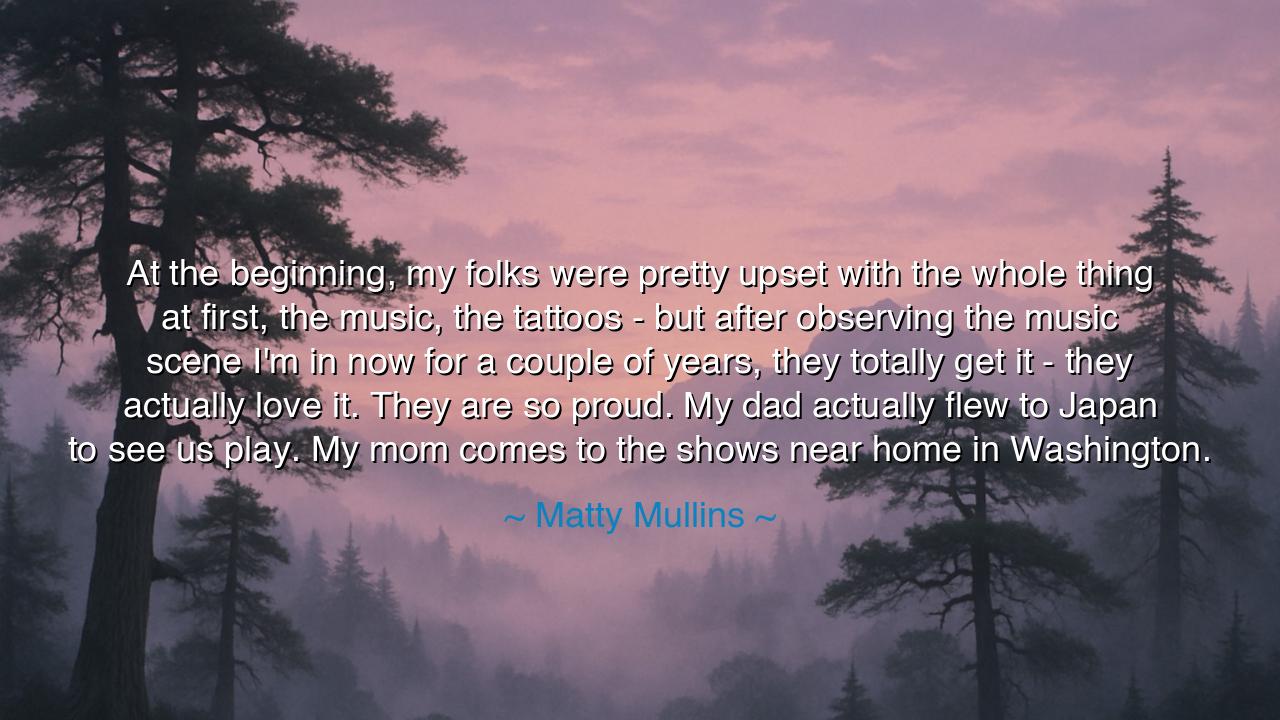
At the beginning, my folks were pretty upset with the whole thing
At the beginning, my folks were pretty upset with the whole thing at first, the music, the tattoos - but after observing the music scene I'm in now for a couple of years, they totally get it - they actually love it. They are so proud. My dad actually flew to Japan to see us play. My mom comes to the shows near home in Washington.






“At the beginning, my folks were pretty upset with the whole thing at first—the music, the tattoos—but after observing the music scene I’m in now for a couple of years, they totally get it—they actually love it. They are so proud. My dad actually flew to Japan to see us play. My mom comes to the shows near home in Washington.” Thus spoke Matty Mullins, the musician whose words echo far beyond the realm of melody and stage. In his reflection lies a story as old as generations themselves—the story of understanding, of the struggle between the old and the new, and of the bridge that love builds when patience and faith endure.
At first glance, his words seem simple—a son following his passion, parents learning to accept it. But in truth, they reveal one of the deepest truths of human life: that time and love are the great interpreters of all division. What begins as fear can end in pride; what begins as distance can end in closeness. For his parents, raised perhaps in a different rhythm of life, the sight of their son covered in tattoos, immersed in the tumult of a modern music scene, must have seemed like a rebellion. And yet, as seasons passed and they saw not chaos, but purpose, not recklessness, but devotion, their hearts were changed—not by argument, but by the quiet testimony of their son’s passion and integrity.
In the ancient world, such a tale would be told of a youth who left his father’s craft to follow the calling of his own spirit. It recalls the story of Daedalus and Icarus, where the father feared the wings the son had built. He warned him not to fly too high, not to go too far. Yet unlike Icarus, Matty Mullins did not fall. He proved that one can soar without forgetting the ground, that the dreams of youth need not destroy the bonds of family. His success, tempered by respect, turned doubt into admiration—so that even his father, once uncertain, crossed oceans to witness his son’s triumph. This is the victory not of fame, but of reconciliation.
In these words, there is also a lesson about authenticity—to remain true to the voice within, even when it is misunderstood. Mullins’s journey reminds us that every generation must face the trial of difference. The old often fear that the new will abandon what they hold sacred. But when the young pursue their callings with honor and compassion, they do not destroy the old—they renew it. His parents’ pride was not born from surrender, but from revelation: they saw that the same courage they once taught him now lived within him in a different form. The music they once feared became the mirror of his spirit, the tattoos they once questioned became the symbols of his story.
Consider, too, the example of Ludwig van Beethoven, whose early love for music was met with anger and confusion by his father, a strict man who wanted to control his son’s gift. Yet as Beethoven grew, his genius became undeniable. Though his life was marked by suffering and loss, his art became immortal—and long after, even those who once doubted him could not help but be proud of what he had become. So it is with every creator, every seeker: the road to understanding is paved with endurance, and time softens resistance into admiration.
The deeper wisdom in Mullins’s reflection is that love endures misunderstanding. It may bend under strain, but it does not break. His parents’ journey from doubt to pride reveals that love, when given the chance to witness truth, always returns stronger. It teaches us not to judge by appearance or by the noise of the unfamiliar, but to look for the light of sincerity beneath it. His father’s journey to Japan is more than a physical voyage—it is the symbolic crossing from skepticism to belief, from fear to pride. His mother’s presence at his concerts is the living proof that acceptance blossoms from love’s persistence.
So let this be the teaching, passed down like a fire from heart to heart: walk your own path with humility and conviction. Let your actions, not your defenses, reveal who you are. Be patient with those who do not yet understand; for even the strongest walls of doubt will crumble before the steady river of time. And to parents and elders, learn this too: do not fear the unfamiliar paths your children take. If they walk them with honesty and purpose, their success will one day bring you joy beyond expectation.
In the end, Matty Mullins’s words are not merely about music or family—they are a hymn to reconciliation, the triumph of love over difference. They remind us that the bond between parent and child, though tested by time and change, is unbreakable when built on respect and faith. The son who dared to follow his calling has returned not as a stranger, but as the fulfillment of the values his parents planted long ago: courage, dedication, and truth. Thus, in the grand rhythm of life, their hearts beat once more in harmony—and the music that once divided them becomes the song that unites them forever.






AAdministratorAdministrator
Welcome, honored guests. Please leave a comment, we will respond soon